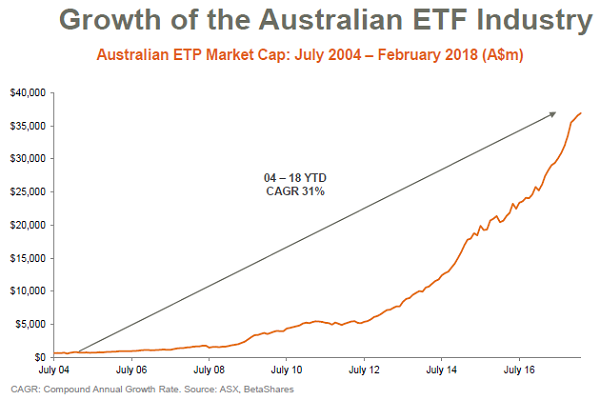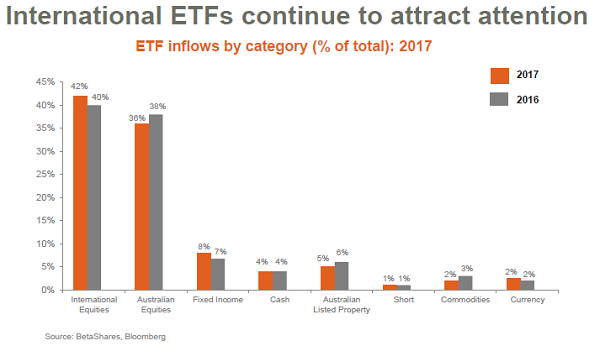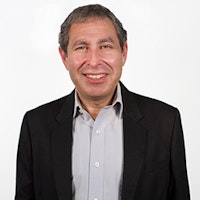ETF investors are getting younger
Summary: Australia's exchange-traded funds market is continuing to mature, with investor numbers having topped 300,000 and rising quickly. Total funds under management have now exceeded $37 billion.
Key take-out: SMSFs were the earliest adopters of ETFs, but millennials, financial planners and institutions have become the new driving forces.
Australia's exchange-traded funds market is evolving rapidly, with the take-up of ETFs products by younger investors accelerating and more financial planners actively recommending them to clients.
It's a trend that is being mirrored in the United States, where millennials (those born from the early 1980s through to the late 1990s) now account for more than 30 per cent of the $US4.8 trillion US ETFs market.
What's the big attraction for millennials? It simply comes down to the fact that ETFs offer easy diversification across different shares and markets, their low-cost structure, and the ability to buy and sell them just like any other stock.
Data from US stockbroker Charles Schwab shows that 63 per cent of US millennials believe ETFs will be their primary investment vehicle in the future, versus only 23 per cent of Baby Boomers.
This week, in Australia, research firm Investment Trends and ETFs product issuer BetaShares released their own findings on the booming domestic ETFs sector, showing a similar gravitation towards these products by younger investors including millennials.
Indeed, their BetaShares/Investment Trends Annual ETF Report 2017 found that currently just over one in four ETF investors are retired, with the typical investor aged 49.
Self-managed super funds, although still a sizeable force in the ETFs sector at 33 per cent, are losing ground to other investor segments.
And that's sending a strong signal to the ETFs market that more solid growth is on the cards, with funds under management in Australia set to rise by at least 30 per cent year-on-year to reach $40-45 billion in 2018.

The Investment Trends annual ETF Report is based on responses of around 6000 investors and 500 financial advisers.
The number of ETF investors in Australia grew 18 per cent in the 12 months to September 2017, reaching 314,000, up from 265,000 the year before. Of those, 105,000 were SMSFs.
Some of the key findings of the research are that:
- ETF investors are getting younger, with the average age of those who started investing in ETFs in the last 12 months 42. That's well down on the average age of 56 among those who started investing in ETFs more than five years ago.
- The ETF market has significant potential for further growth with the number of “next wave” ETF investors reaching record highs. Almost one third of these investors are millennials (those born from the early 1980s through to the late 1990s).
- There are now more than 175 individual ETF products listed on the ASX, with investors channelling more capital into non-equities products such as cash and fixed income.
- While SMSF usage of ETFs remains strong, there is increasing adoption by self-directed non-SMSF investors.
- Diversification, cost-effectiveness and access to overseas markets are the top drivers of investing in ETFs.
- Approximately 60 per cent of Australian financial planners recommend ETFs or intend to do so within the next 12 months.
- Actively managed ETFs are now a growing segment as investors seek out products designed to outperform the market.
During 2017, more than 70 per cent of total inflows were captured by three issuers: Vanguard, IShares and BetaShares.
The report shows that 42 per cent of ETF inflows in 2017 went into international equities, from 40 per cent in 2016, while inflows into Australian equities fell from 38 per cent to 36 per cent. Inflows into fixed income ETFs rose from 7 per cent to 8 per cent.

Investment Trends also found that most of the ETF industry's growth was a result of new money into the wealth management industry rather than a substitute for other investment structures.
The growth in millennials
One of the most interesting trends in the usage of ETFs is the growth in support from millennials, reflecting that these products are becoming more widely known and accepted.
The report found that almost one third of ‘next wave' investors (defined as those planning to invest in ETFs in the next 12 months), are millennials who appear to be particularly interested in ETFs as part of their investment strategy.
When looking at individuals who use online brokers to invest, Investment Trends found that 38 per cent of millennials currently use or intend to use ETFs in the next year, compared to 32 per cent of Gen X investors and 27 per cent of those in the Baby Boomer generation.
“The ETF industry has continued to grow and mature in Australia, and this year we are seeing evidence of a marked change in the type and age of investors as it becomes more mainstream,” says BetaShares Chief Executive Officer, Alex Vynokur.
“The combination of the historically low interest rate environment in Australia and low levels of affordability for residential housing is causing millennial investors to think in new ways about investment and wealth creation.”
Financial planners are rapid adopters
Another key finding was that financial planners are now adopting ETFs in a meaningful way, with approximately 60 per cent of Australian planners currently recommending ETFs or intending to do so within the next 12 months.
Planners who currently recommend ETFs typically invest 17 per cent of new client money in them, and are expressing an intention to increase this allocation over time – with this number set to increase to 20 per cent by 2020.
The key motivations for planners recommending ETFs remains similar to those of end investors: low cost, diversification, liquidity, access to specific overseas markets, and access to specific types of investments/asset classes.
Vynokur says that while financial planner ETF usage is high, there remains a significant opportunity for them to get more involved in the ETF market, with only one in every four investors saying a planner was involved in their most recent decision to invest in ETFs.
One thing is certain. Australia's ETFs sector is growing and evolving rapidly, and there will likely be a slew of new products hitting the market aimed at attracting more self-directed investors, especially those forming the millennials generation.
















